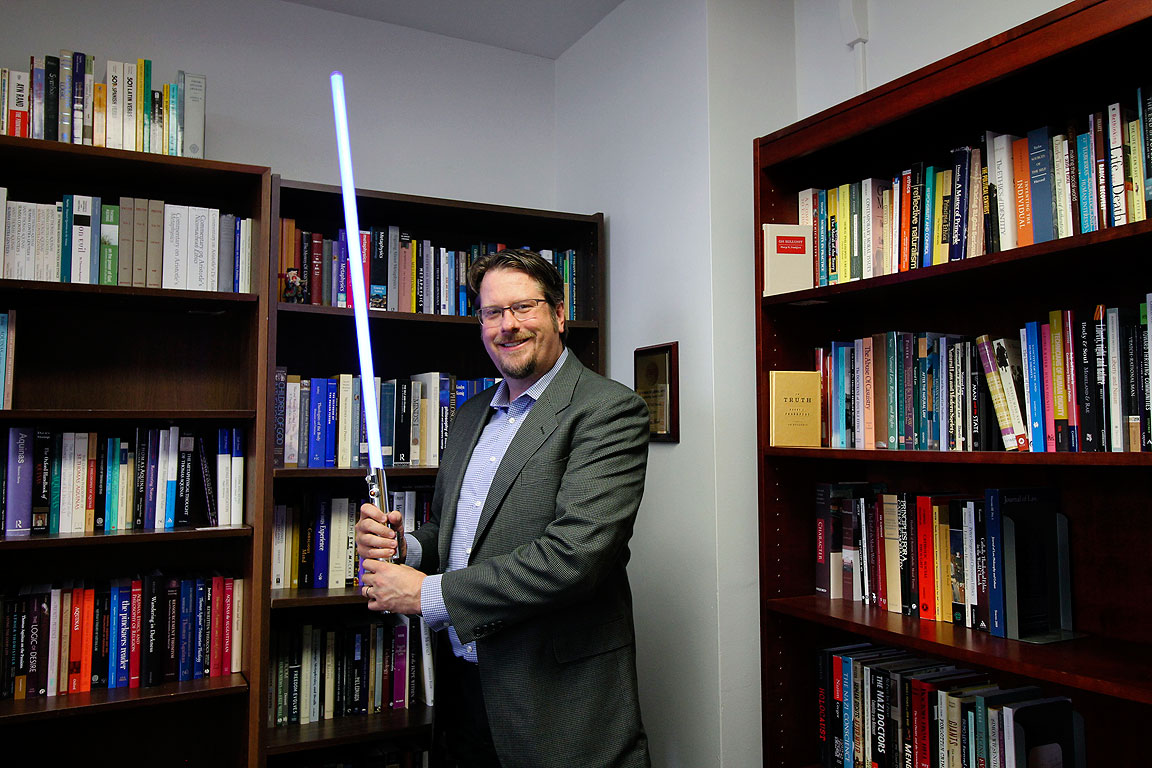'To Boldly Go' Where Ethics Hasn't Gone Before: SLU Bioethicist Channels Love of Sci-Fi Into Teaching
Maggie Rotermund
Senior Media Relations Specialist
maggie.rotermund@slu.edu
314-977-8018
Reserved for members of the media.
While blockbuster films and television series follow the adventures of a young Han Solo and the exploits of the crew of the Starship Enterprise, Jason Eberl, Ph.D., a bioethicist at Saint Louis University, is looking to galaxies far, far away and the far-fetched worlds of science fiction to consider pressing questions about humanity, health care and ethics.
“Science fiction does raise a lot of interesting bioethical questions,” Eberl explained, “more so than many other genres like fiction or drama. It’s not a morally black and white universe.”
Eberl, a professor in SLU’s Albert Gnaegi Center for Health Care Ethics, channels his own love of sci-fi to help students consider questions related to bioethics as diverse as cloning, organ donation, human enhancement and health care access. Growing up, Eberl was a big fan of George Lucas’s Star Wars series, Gene Roddenberry’s Star Trek universe, and all things fantastical and far-reaching.
“Star Trek helped make me want to be a philosopher,” he said. “Star Wars helped deepen my faith as a Catholic.”
Originally trained as a philosopher specializing in the works of St. Thomas Aquinas, Eberl began combining his passion for philosophy and ethics with his life-long love of Star Wars, Star Trek and other science fiction series after earning his doctorate under renowned SLU scholar Eleonore Stump, Ph.D., in 2003. He taught at Indiana University and Marian University’s College of Osteopathic Medicine before returning to SLU in spring of 2018.

Eberl has written over 65 articles and books on philosophical and bioethical issues. While Eberl’s curriculum vitae includes traditional academic work in journals including The National Catholic Bioethics Quarterly, the American Journal of Bioethics and the Journal of Medicine and Philosophy, he has also published extensively for average readers, using science fiction to expose complicated ethical scenarios and metaphysical themes. These publications include The Philosophy of Christopher Nolan, The Ultimate Star Trek and Philosophy: The Search for Socrates and The Ultimate Star Wars and Philosophy: You Must Unlearn What You Have Learned, the last two with fellow SLU alumnus Kevin Decker, Ph.D.
Linking the Philosophy of the Past with the Science of Tomorrow
Using science fiction as a way to consider ethical and philosophical questions, he continued, connects the past and future through thousands of years of philosophy and scientific evolution.
“I approach questions not just as a bioethicist but also as someone interested in broader metaphysical questions,” Eberl said. “Thomists like me still feel Aquinas has things to say today. He was doing the most cutting-edge thinking of his day. We can link a 13th century philosopher to an envisioned 24th century future.”
Articles and books aren’t the only way that Eberl brings his love of lightsabers into his scholarly work. In spring 2019, he will teach an undergraduate course, HCE 3050 “Bioethics in Popular Culture.” The class will cover bioethical topics including stem cell research, patient-health care provider relationships, genetic testing and end-of-life care as popular culture depicts them. The class will use films, academic articles, novels and music to consider the ethical ideas and issues in play.
As a result, students may consider a doctor’s decision making by comparing Leonard McCoy and Beverly Crusher from different Star Trek Series. Or a debate in Eberl’s class might center on whether the genetic engineering at the heart of the film Gattaca was ethical.
“We live in a time when people tend to think that there are no right or wrong answers about these issues or what it is to be human, or that the only facts that are worth considering are those from empirical science,” he noted. “There are, however, more or less reasonable answers to these questions that we can debate.”
Using diverse source materials and approaching philosophy through popular culture allows students to consider the complicated moral, social, political and societal aspects of topics they read about every day, Eberl said. It also allows students to connect thinking about ethics and philosophy with science in new ways.
“The best philosophy going back to Aristotle was informed by the science of the day,” Eberl continued. “But philosophers are equipped to ask questions that empirical science can’t answer. That’s where science fiction comes in – it takes us beyond what we know now to ask those questions. Science fiction provokes those questions that involve science but cannot be answered by empirical scientific methods alone.”
Founded in 1818, Saint Louis University is one of the nation’s oldest and most prestigious Catholic institutions. Rooted in Jesuit values and its pioneering history as the first university west of the Mississippi River, SLU offers nearly 13,000 students a rigorous, transformative education of the whole person. At the core of the University’s diverse community of scholars is SLU’s service-focused mission, which challenges and prepares students to make the world a better, more just place.



















